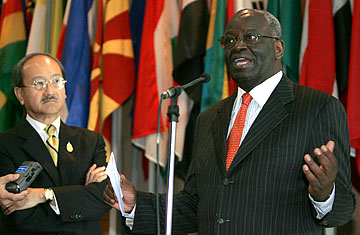
United Nations envoy Ibrahim Gambari answers questions during a press conference with Thai Foreign Minister Nitya Pibulsonggram in Bangkok, Oct. 15, 2007
It's a symbol of how grim the prospects of reconciliation are in Burma that a lone Nigerian diplomat door-stopping Asian leaders may be the best hope for the country's 53 million citizens. This week, as the Burmese government admitted that it had arrested nearly 3,000 people during the September crackdown in which troops fired on unarmed protesters, United Nations special envoy Ibrahim Gambari sped through Asian capitals trying to galvanize more action from Burma's neighbors — among them the very countries whose economic ties help prop up one of the world's most repressive regimes. He began his trip in Thailand on Monday before heading to Malaysia the next day. Stops in Indonesia, India, China and Japan will round out his trip. Next month, Gambari hopes to return to Burma to continue dialogue with the reclusive generals who have ruled the nation with an iron fist for 45 years.
Gambari is a skilled diplomat, and his mission to Burma earlier this month resulted in a rare get-together with the junta's top leaders. He also wangled two meetings with Nobel Peace Prize laureate Aung San Suu Kyi, who has spent more than half of the past two decades under house arrest. Last week, Gambari briefed the United Nations Security Council on his Burma trip — and his harsh criticism of the junta presumably helped prompt the international body's first-ever statement condemning the violence. With news leaking out of Burma of further arrests of pro-democracy activists and continuing raids against monks whose spiritual authority convinced tens of thousands of Burmese to flood the streets in peaceful protest, Gambari this week kept up his verbal barrage against the junta. "These actions must stop at once," he said during his Bangkok stop.
But words can only do so much. Holed away in their newly built jungle capital, Burma's military leaders have shown little sign that the global condemnation is taking any effect. Back in 1988, the army massacred thousands of unarmed protesters with few economic or political repercussions; the generals must be hoping that their latest crackdown will also bring similar results. Shortly after Gambari's visit, junta leader Than Shwe announced that he would be willing to meet with Suu Kyi, whose National League for Democracy won landslide elections in 1990 that the military refused to honor. But the junta leader predicated any confab on the opposition leader giving her up pro-democracy stance, something she refuses to do. In the months leading up to the September clampdown, the junta kicked out the International Red Cross and for four years has refused to meet with representatives from a U.N. human-rights body. "These generals do not know how to negotiate," says exiled Burmese military officer Khin Maung Nyunt, who now lives in the U.S. "Either they follow orders from above or command other people to do things. Political dialogue is something strange for them."
On Tuesday, Japan, Burma's largest aid donor, announced it was canceling a nearly $5 million educational grant in response to the killing of Japanese video journalist Kenji Nagai by a Burmese soldier during the Sept. 26-27th violence. The Burmese government has admitted that 10 people died during the crackdown, while dissident groups believe the true number is much higher. But $5 million is pocket change for the generals, who get big money from trade partnerships with Burma's fast-growing neighbors. Earlier this week as Gambari began his Asia trip, Thailand and Malaysia, two of Burma's key economic partners, ruled out sanctions against the military regime. (The U.S. and European Union have for years maintained punitive economic bans against Burma, and both have tightened restrictions against the junta in response to last month's brutal crackdown.)
Part of the problem is that despite its reputation for isolation, Burma is well-integrated into the regional economy, especially after it joined the Association of Southeast Asian Nations (ASEAN) a decade ago. Roughly 20% of Thailand's electricity is generated by Burmese natural gas. Malaysian and Thai companies are building new hydropower plants in Burma. China and India are hungrily eyeing the country's potentially vast natural-gas reserves to power their own growing economies. ASEAN members maintain that economic assimilation has a better chance of encouraging political reform than financial segregation. The debate of whether sanctions work divides even the Burmese exile community. But one thing is certain: Without more pressure on Burma's generals from the Asian governments who help fuel their lavish lifestyles, life will probably not get much better for the country's impoverished citizens. Right now, the burden is on a solitary Nigerian to change that.
